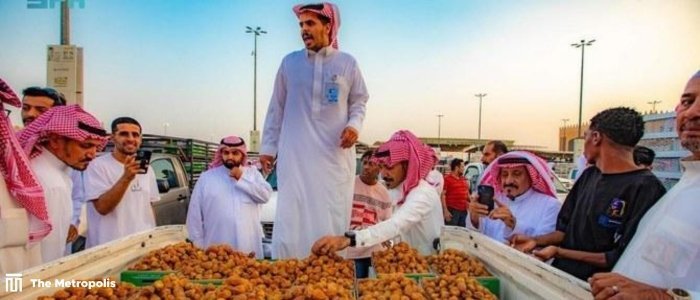Source- Arab News
Metropolis Desk-
Since dates are harvested throughout the summer, the majority of the Kingdom’s regions view it as the golden season. Many Saudi localities that grow dates compete with one another by hosting festivals to get more consumers to their produce.
The National Center for Palms and Dates, the Riyadh Municipality, and the Ministry of Environment, Water, and Agriculture collaborated to launch the Riyadh Seasonal Date Fair in early August. The 60-day fair, which includes a variety of agricultural organisations, aims to boost the palm and date industry, which generates $2 billion (SR7.5 billion), or 13% of the Kingdom’s total agricultural output.
A quarter of the Kingdom’s total output comes from Riyadh, where production exceeds 400,000 tons. The Kingdom also has more than 33 million palm trees, or almost 27 percent of all palm trees on earth.
The fair, according to Sulaiman Al-Jatily, general director of the ministry’s General Administration of Agricultural Associations and Marketing, aims to enhance the marketing environment for dates in Riyadh and establish the ideal circumstances to increase the advantages for farmers, investors, and consumers.
“The fair targets farmers who have obtained the Saudi Dates mark, as well as the certificate of organic farming and quality, and also seeks to activate the role of the farmer by marketing his crop and displaying it directly inside the fair,” he said.
The Buraidah Date Festival, meantime, draws tourists and date traders from the Arab Gulf countries every year. It lasts 30 days and offers more than 40 distinct varieties of dates. The festival’s organizers claim that more than 4,000 young people, including both men and women, as well as numerous successful families and artists, participate.
The Majid Al-Khamis Agricultural Consulting Office’s director, Majid Al-Khamis, stated that date festivals are crucial in Saudi Arabia for a number of reasons, including promoting culture and tradition.
The fairs offer a chance to display and advertise Saudi Arabia’s extensive cultural history associated with date cultivation and industry.
They display several varieties of local dates and hold heritage activities and performances that emphasize the practices and traditions related to date production and harvesting.
Al-Khamis claimed that date celebrations both draw tourists and visitors from within and outside the Kingdom, as well as aiding the local economy. Many visitors travel here to view and purchase various dates as well as to learn more about Saudi Arabia’s date-growing tradition. During these festivals, visitors can take pleasure in the supporting entertainment and cultural events.
He claimed that innovative date cultivation and development methods as well as scientific studies are presented during the festivals. Additionally, they demonstrate contemporary date cultivation methods that enhance product quality and productivity. These gatherings encourage the sharing of information and expertise between researchers, farmers, and everyone with an interest in the date sector.
The Al-Fankha Festival in the town of Al-Khafah, 160 kilometers southeast of Hail, encouraged Fawaz Abdulwahhab, a retail date merchant from the village of Alkohaifiah, which is famed for producing a variety of date known as Al-Fankha. Additionally, he said that his participation in the festival, which took place in October of last year, netted him a considerable financial benefit.
He does not own a single farm, but he has bought the entire crop from multiple farmers and is currently packing it. When it is time to harvest them, he starts to dry part of the dates while keeping the others on the palm fronds. He then packs the dates at the factory. Then he gets to work preparing the quantity that will be sold and on display during festival days.




